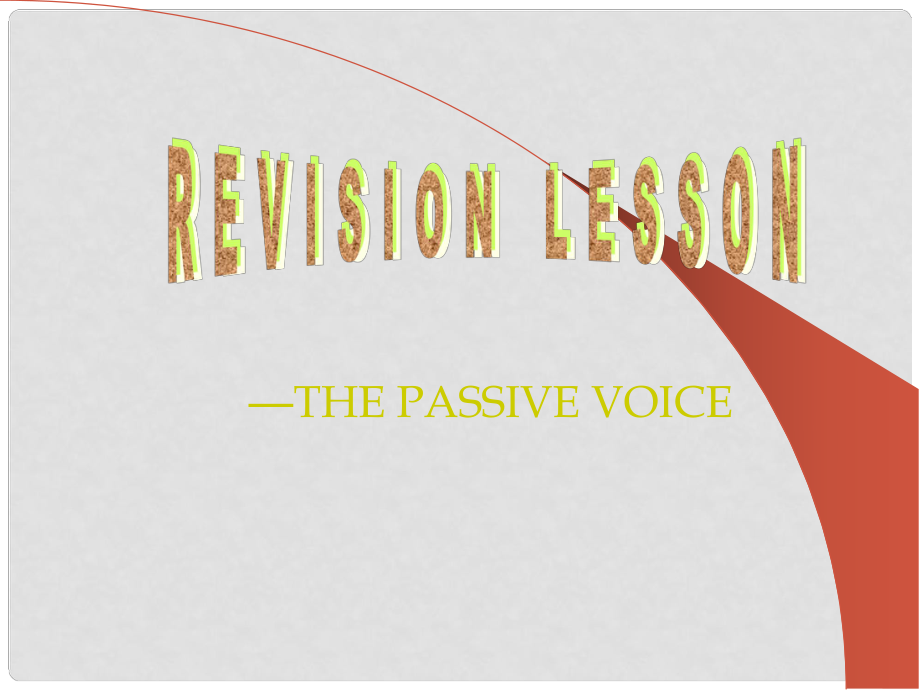《北京市房山區(qū)周口店中學(xué)九年級(jí)英語(yǔ)全冊(cè) 被動(dòng)語(yǔ)態(tài)復(fù)習(xí)課件》由會(huì)員分享�����,可在線閱讀�,更多相關(guān)《北京市房山區(qū)周口店中學(xué)九年級(jí)英語(yǔ)全冊(cè) 被動(dòng)語(yǔ)態(tài)復(fù)習(xí)課件(11頁(yè)珍藏版)》請(qǐng)?jiān)谘b配圖網(wǎng)上搜索�。
1��、THE PASSIVE VOICE助動(dòng)詞助動(dòng)詞be + done(be + done(動(dòng)詞的過(guò)去分詞動(dòng)詞的過(guò)去分詞) )1�����、一般現(xiàn)在時(shí)一般現(xiàn)在時(shí):2�����、一般過(guò)去時(shí)一般過(guò)去時(shí):3����、一般將來(lái)時(shí)一般將來(lái)時(shí):4、現(xiàn)在進(jìn)行時(shí)現(xiàn)在進(jìn)行時(shí):am/is/are + done He is always invited to our school.was/were + done Our classroom building was built in 2000.will/shall + be donebe going to be done He will be taken to hospital tomorrow.
2����、am/is/are + being + done The classroom is being cleaned now.5、現(xiàn)在完成時(shí)現(xiàn)在完成時(shí):6����、情態(tài)動(dòng)詞情態(tài)動(dòng)詞:(如 can)have/has + been done Many high buildings have been built in our city since I came here.can + be done The work cant be finished in an hour.主動(dòng)語(yǔ)態(tài)與被動(dòng)語(yǔ)態(tài)的轉(zhuǎn)換主動(dòng)語(yǔ)態(tài)與被動(dòng)語(yǔ)態(tài)的轉(zhuǎn)換例: I teach you.You are taught (by me).1. He tea
3�、ches English in our school. - English is taught in our school by him.2. You must wash your hands before meals.- Hands must be washed before meals.3. I returned the book to the library yesterday.- The book was returned to the library by me.主動(dòng)主動(dòng)變被動(dòng)步驟變被動(dòng)步驟1.主動(dòng)句的賓語(yǔ)變?yōu)楸粍?dòng)句的主語(yǔ)2.主動(dòng)語(yǔ)態(tài)的謂語(yǔ)動(dòng)詞改用Be+done的結(jié)構(gòu)3.by引出動(dòng)作
4��、的執(zhí)行者�,但若沒(méi)有必要指明動(dòng)作的執(zhí)行者時(shí),by短語(yǔ)可以省略1. My coat is made _ cotton and _ shanghai.A. from/in B. of/in C. of/by D. from/by2. The strong wine is made _ rice.A. of B. from C. with D. in3. Computers are useful. For example, they can _ sending E-mail.A.use for B. be used of C. be used for D. use of4. A lot of new
5��、roads _ built in the west of China.A. must B. must be C. has D. haveBBCB5. His car _ tomorrow.A. will be repaired B. is repairedC. is being repaired D. has been repaired6. A new classroom _ in our school.A. is being built B. built C. build D. had built8. Bananas _ in Hainan.(海南種植香蕉)9. English _ in t
6��、heir country. (他們國(guó)家說(shuō)英語(yǔ))10. Our school _ in 1990.(我們學(xué)校不是 1990年建的)7. _ language is spoken _ the largest number of people.A. What/of B. Which/of C. Which/by D.Whose/ofACare grownis spokenwasnt built A 現(xiàn)在英語(yǔ)被廣泛地使用�,許多國(guó)家說(shuō)英語(yǔ),例如美國(guó)��、澳大利亞����。人們認(rèn)為英語(yǔ)已經(jīng)成為世界語(yǔ)言�。如果你喜歡讀書(shū)��,你會(huì)發(fā)現(xiàn)許多書(shū)是用英語(yǔ)寫(xiě)的。所以作為一名中學(xué)生��,我們應(yīng)盡最大的努力學(xué)好英語(yǔ)�。CONCLUSION(小結(jié)) 1.被動(dòng)語(yǔ)態(tài)的用法。 2.主動(dòng)語(yǔ)態(tài)和被動(dòng)語(yǔ)態(tài)的轉(zhuǎn)換����。 1.Make up five sentences with five different tenses. 2.Get ready for the dictation.
 北京市房山區(qū)周口店中學(xué)九年級(jí)英語(yǔ)全冊(cè) 被動(dòng)語(yǔ)態(tài)復(fù)習(xí)課件
北京市房山區(qū)周口店中學(xué)九年級(jí)英語(yǔ)全冊(cè) 被動(dòng)語(yǔ)態(tài)復(fù)習(xí)課件

